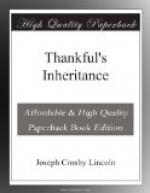The High Cliff boarders—Miss Timpson and Caleb Hammond especially—spent a great deal of time peering from the living-room windows and watching what they called the “goin’s on” at the Kendrick estate. Occasionally they caught a glimpse of E. Holliday himself. The great man was inclined to greatness even in the physical meaning of the word, for he was tall and stout, and dignified, not to say pompous. Arrayed in white flannels he issued orders to his hirelings and the hirelings obeyed him. When one is monarch of the larger portion of all he surveys it must be gratifying to feel that one looks the part. E. Holliday looked it and apparently felt it.
Thankful, during this, her most prosperous season, was active from morning until night. When that night came she was ready for sleep, ready for more than she could afford to take. Emily was invaluable as manager and assistant, and Captain Obed Bangs assisted and advised in every way that he could. The captain had come to be what Mrs. Barnes called the “sheet anchor” of the High Cliff House. Whenever the advice of a man, or a man’s help was needed, it was to Captain Bangs that she turned. And Captain Obed was always only too glad to help. Hannah Parker declared he spent more time at the boarding house than he did at her home.
If Emily Howes noticed how frequently the captain called—and it is probable that she did—she said nothing about it. John Kendrick must have noticed it, for occasionally, when he and Captain Obed were alone, he made an irrelevant remark like the following:
“Captain,” he said, on one occasion, “I think you’re growing younger every day.”
“Who? Me? Go on, John! How you talk! I’m so old my timbers creak every time I go up a flight of stairs. They’ll be sendin’ me to the junk pile pretty soon.”
“I guess not. You’re as young as I am, every bit. Not in years, perhaps, but in spirit and energy. And you surprise me, too. I didn’t know you were such a lady’s man.”
“Me? A lady’s man? Tut, tut! Don’t talk foolish. If I’ve cruised alone all these years I cal’late that’s proof enough of how much a lady’s man I am.”
“That’s no proof. You haven’t happened upon the right sort of consort, that’s all. Look at Brother Daniels; he is a bachelor, too, but everyone knows what a lady’s man he is.”
“Humph! You ain’t comparin’ me to Heman Daniels, are you?”
“No. No, of course not. I shouldn’t dare. Comparing any mortal with Daniels would be heresy, wouldn’t it? But you certainly are popular with the fair sex. Why, even Imogene has fallen under the influence. She says Mrs. Barnes thinks you are the finest man in the world.”
“She does, hey? Well,” tartly, “she better mind her own affairs. I thought she rated Kenelm Parker about as high as anybody these days. He spends more time in that kitchen of hers—”
“There, there, Captain! Don’t sidestep. The fair Imogene may be susceptible to Mr. Parker’s charms, but that is probably because you haven’t smiled upon her. If you—”




